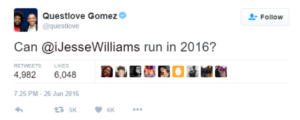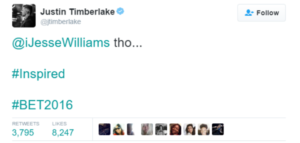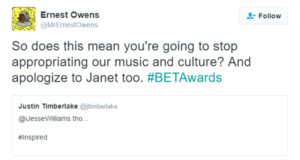
On Sunday night at the BET Awards, actor and activist, Jesse Williams delivered what was, arguably, the most powerful award acceptance speech ever. Williams, who is known for his active involvement in the Black Lives Matter movement and his outward discourse on social justice issues, addressed complex topics like police brutality and cultural appropriation in his speech. And he did so, in such a beautifully succinct manner. Journalist Shaun King compared Williams’ speech to the likes of some of the civil rights movement’s greats—
“[Williams] did it using words that felt like they had been written by James Baldwin and delivered by Malcolm X.”
I agree. I was moved—along with everybody else on my social media timelines. Evidently, Justin Timberlake was too.
Moments following Jesse’s speech, JT engaged via Twitter:
First, he retweeted a pretty harmless tweet by Questlove.

Then, he showed his support by chiming in on how he was also inspired by Jesse’s speech.

And this is where it got real. In response to J.T.’s tweet, several twitter users responded, calling out J.T. for his role in cultural appropriation—a topic Jesse specifically addressed in his speech:
“We’ve been floating this country on credit for centuries, yo. And we’re done watching, and waiting while this invention called whiteness uses and abuses us. Burying black people out of sight and out of mind, while extracting our culture, our dollars, our entertainment like oil — black gold. Ghettoizing and demeaning our creations then stealing them. Gentrifying our genius and then trying us on like costumes before discarding our bodies like rinds of strange fruit. The thing is, though, the thing is, that just because we’re magic doesn’t mean we’re not real.” -Jesse Williams

There is definitely some validity in this Twitter user’s inquiry. I won’t get into my point of view on “why.” Shaun King provides a thorough breakdown, here. However, I would like to focus on JT’s response, and use it to introduce our new series on differentiating Intent vs. Impact, and identifying teachable moments in our own culturally incompetent “gaffes.”
Let’s examine JT’s responses:

Oh, Justin.
Now, let’s talk Intent vs. Impact.
On Intent… I think it is safe to say that JT initially had good intentions, here. He was “inspired” by the speech, and, in his mind, wanted to show his “solidarity” and “understanding.” Perhaps that is why he jumped on the defense, a bit, when he was challenged. And when he referred to us all being “one…human race,” he probably thought he was being noble, an “ally.”
On Impact… I think it is even safer to say that little to none of JT’s “intentions” resonated as he expected them to, particularly among Black people. His seemingly innocent, yet shallow reflections on Jesse’s speech suggest he didn’t quite get the message or understand his role in being part of “the problem” that Jesse so eloquently explained. His disregard for the Twitter user’s question was seen as condescending, and was reminiscent of a silencing that is all too familiar to marginalized groups when discussing race or inequity with their privileged counterparts (think, Black Lives Matter vs. All Lives Matter). When he followed up with pointing out our commonalities as “one..human race,” he minimized the very experiences of Black people that were highlighted in the speech he was, only moments ago, “inspired” by.
On teachable moments… Justin’s response was a classic example of “Minimization.” Minimization is a developmental orientation on the Intercultural Development Continuum where one typically overemphasizes similarities, without regard to or understanding of critical differences. Yes, we are in fact one human race. But we must not disregard the fact that different races experience culture and systems very differently in the United States, and across the world.
JT could’ve used the Twitter “push back” as an opportunity to reflect, fully internalize Jesse’s speech and the twitter user’s response, consider his privilege, and identify where there may be gaps in how he sees himself vs. how others (specifically people of color) may perceive him. But, he isn’t alone.
Hopefully, JT and we all can use this as a “teachable moment” in differentiating the intentions behind our actions from the impact we actually have.


















